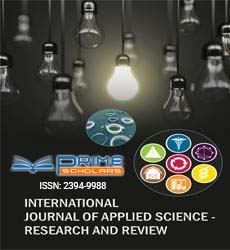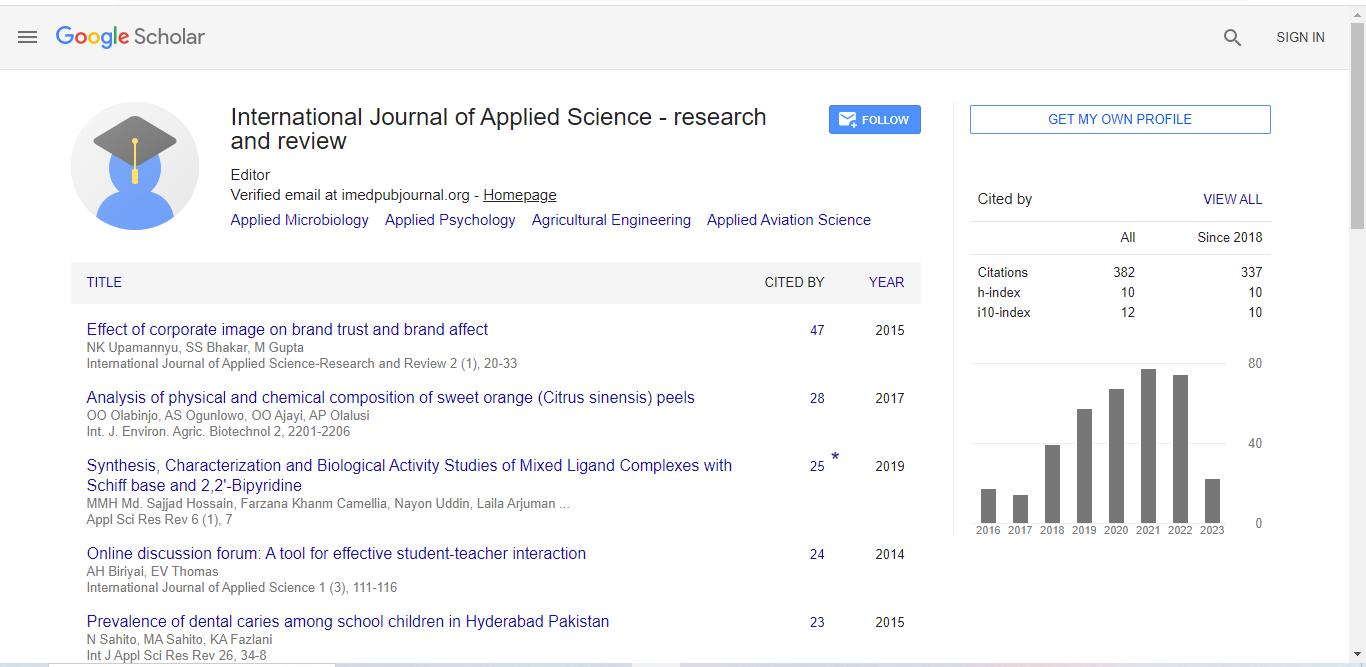Opinion - (2023) Volume 10, Issue 6
Breathless Earth: The Growing Impact of Climate Change on Respiratory Health
Ezekiel Josiah*
Department of Applied Science, University of Valencia, Spain
*Correspondence:
Ezekiel Josiah,
Department of Applied Science, University of Valencia,
Spain,
Email:
Received: 29-Nov-2023, Manuscript No. IPIAS-23-18833;
Editor assigned: 01-Dec-2023, Pre QC No. IPIAS-23-18833 (PQ);
Reviewed: 15-Dec-2023, QC No. IPIAS-23-18833;
Revised: 20-Dec-2023, Manuscript No. IPIAS-23-18833 (R);
Published:
27-Dec-2023, DOI: 10.36648/2394-9988-10.6.55
Introduction
As the global climate continues to undergo unprecedented changes,
the ramifications of these shifts extend far beyond rising temperatures
and extreme weather events. One of the alarming consequences
that has gained increasing attention in recent years is
the growing impact of climate change on respiratory health. The
intricate interplay between environmental factors and human
well-being has never been more evident, as the Earth’s atmosphere
transforms, bringing about a surge in respiratory challenges
for populations worldwide. Climate change contributes to respiratory
health issues through a myriad of interconnected pathways.
One of the most direct and immediate effects is the alteration of
air quality. The rise in temperatures and changing weather patterns
exacerbate air pollution, with higher temperatures enhancing
the formation of ground-level ozone and particulate matter.
These pollutants are notorious for triggering and worsening respiratory
conditions such as asthma, chronic obstructive pulmonary
disease (COPD), and bronchitis. Prolonged exposure to polluted air
can lead to increased respiratory symptoms, hospital admissions,
and even premature mortality.
Description
Another significant consequence of climate change is the proliferation
of allergens and the lengthening of allergy seasons. As temperatures
rise and carbon dioxide levels increase, plants produce
more pollen, resulting in longer and more intense allergy seasons.
For individuals with respiratory conditions like asthma, heightened
pollen levels can lead to more frequent and severe attacks. Furthermore,
the changing climate facilitates the spread of invasive
plant species, introducing new allergens to areas that were previously
unaffected. Beyond outdoor air quality, climate change also
influences indoor air quality, which is particularly concerning given
that people spend the majority of their time indoors. Increased
temperatures can intensify the growth of indoor mold, a known
respiratory irritant. Additionally, extreme weather events, such as
floods and hurricanes, may lead to water damage in homes, fostering
conditions conducive to mold growth. The resulting indoor
air pollution poses a significant threat to respiratory health, particularly
for vulnerable populations. The impact of climate change
on respiratory health is not limited to the physical manifestations
of air quality and allergen changes. Mental health can also be affected,
as the anxiety and stress associated with climate-related
events contribute to respiratory symptoms. Displacement due to
extreme weather events, loss of homes, and the uncertainty of
the future can lead to heightened stress levels, exacerbating respiratory
conditions and diminishing overall well-being. Vulnerable
populations, including children, the elderly, and those with
pre-existing respiratory conditions, bear the brunt of the growing
impact of climate change on respiratory health. Children, whose
respiratory systems are still developing, face an increased risk of
long-term damage from exposure to air pollutants. Similarly, the
elderly, often dealing with weakened immune systems and multiple
chronic conditions, are more susceptible to the exacerbation
of respiratory issues.
Conclusion
In conclusion, the escalating challenges posed by climate change
on respiratory health demand urgent attention and comprehensive
strategies. Mitigating the impact requires a multifaceted approach,
including global efforts to reduce greenhouse gas emissions,
adaptation measures to protect vulnerable populations, and
enhanced public health initiatives. As the world grapples with the
far-reaching consequences of a changing climate, addressing the
growing impact on respiratory health becomes not only a health
imperative but also a crucial aspect of ensuring the overall well-being
of present and future generations.
Citation: Josiah E (2023) Breathless Earth: The Growing Impact of Climate Change on Respiratory Health. Int J Appl Sci Res Rev
10:55.
Copyright: ©2023 Josiah E. This is an open-access article distributed under the terms of the Creative Commons Attribution License, which permits unrestricted use, distribution, and reproduction in any medium, provided the original author and source
are credited.

